
When it comes to careers, one of the areas of growing interest among MBAs is the sustainability and corporate social responsibility (CSR) sector. Over the past 10 years, corporations have been increasingly focused on managing their social and environmental impacts and understanding the cost and revenue implications of initiatives that range from managing the human rights practices of their overseas factories to installing solar panels on their corporate campuses. As sustainability becomes a business issue of increasing strategic importance, it is also becoming more established as a career path. In 2014, the data source Wanted Analytics estimated that sustainability jobs had more than doubled in demand in 4 years. Sustainability recruiter Ellen Weinreb likewise documents growth in the most senior of these roles – the Chief Sustainability Officer.
We took a moment to sit down with Mackenzie Sullivan, Sector Director for Social Impact and Sustainability Careers in Fuqua’s Career Management Center to get her take on the sustainability/CSR hiring space. Here is our Q&A with Mackenzie.
Are there any trends you’ve noticed in sustainability/CSR hiring recently?
One of the trends that I’ve noticed in the last year or so is that it seems like more companies are willing to hire external candidates for their sustainability/CSR departments. Historically, many companies have hired internal candidates for these departments. It remains to be seen whether this is really a trend, but recently I’ve noticed more companies recognizing the value of hiring outside people directly into these departments.
CSR/sustainability employers are less likely to recruit MBAs through the “on campus” recruiting process. What is your advice about how students should think about tackling the job search?
First, students should start by identifying which companies have strong sustainability initiatives and/or CSR departments. You don’t want to target a company where sustainability does not really impact their bottom line or it’s not a part of their core business. Next, identify alumni who can help you make connections. I also recommend students use LinkedIn to check out the profiles of professionals working in those departments. Do they have MBAs in the department? Does it look like you’d be a likely candidate for that department? Then, focus on networking. And remember, you can always gain access to a company through another function that is closely tied to the CSR initiatives (like marketing).
Who are some example CSR/sustainability employers?
Unilever comes to mind because they are such a large multinational corporation and one that has been very visible on sustainability issues. A lot of the outdoor industry companies also come to mind because sustainability issues are often part of their culture. They don’t necessarily have large numbers of professionals working in their sustainability departments, because they tend to be smaller companies, but their cultures tend to support sustainability. I’ve also started to see a lot of food and beverage companies hiring in sustainability – for instance, Chipotle and McDonald’s – because they realize that sustainability issues have a big impact on their bottom line and consumers are putting a lot of focus on sustainably-sourced food.
What’s different about how students position themselves for CSR/sustainability jobs versus other MBA jobs?
I think one difference is the way they think about getting into the roles. Students should be thinking about: which companies do they really want to work for, and can they go into one of these companies through a more traditional role? For instance, they might go into a company in a marketing role or supply chain management role, where they can learn the in’s-and-outs if the business, and then think about moving into the sustainability department eventually. It’s more of a long-term view and plan.
I think also when they are positioning themselves to go into a sustainability or CSR department, they truly have to understand how is it that that department is, or is not, impacting the bottom line of the company. Is this a feel-good thing? Or is it something that is truly saving the company money?
The third thing to keep in mind is to be able to talk to companies about: where is the proof in what you have done? Is it your degree? Is it what you did previously? You need to have the business skills, but also prove you have the passion behind the work.
Are there any other skills or traits that employers are looking for when it comes to these roles?
I think it’s really understanding the industry that you’re going into. If you’re going to work for Levi’s, really understand the apparel industry. Also, financial skillsets are really important, regardless of what role you’re going into.
Are there any missteps you would caution students against when they approach the sustainability/CSR job search?
Don’t put all your eggs in one basket; recognize that these jobs are really, really competitive. Focus not only on the well known brands and companies. Broaden the list of companies you are looking at. But at the same time, put your energy toward what you’re really interested in. Don’t spend a lot of time chasing other career options if what you’re interested in is sustainability.
Finally, what makes this field compelling as a career path?
I think for MBA students who are passionate about using business to create social or environmental good, this is an opportunity to have a career that is really using the skills that you want to use and know that you are having an important impact. The students who go into these careers have the satisfaction of knowing that they’re fulfilling their personal mission while also being really challenged in their professional life. I don’t have any of these students reaching out to me a year or two after graduation saying, “I wish I had done something else.”
—